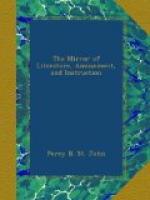That “familiarity breeds contempt” does not only mean, that he who is too familiar with us incurs our contempt; but also that novelty being indispensably necessary to our happiness we cease to admire what habit has familiarized.
Poverty, like every thing else has its fair side. The poor man has the gratification of knowing that no one can have any interest in his death; and in his intercourse with the world he can be certain that wherever he is welcome, it is exclusively on his own account.
If the poor have but few comforts, they are free from many miseries, mental as well as personal, that their superiors are subjected to: they have no physicians who live by their sufferings, and they never experience the curse of sensibility.
Eloquence, engaging as it is, must always be regarded with suspicion. The great use made of it in the history of literature, has been to mislead the head by an appeal to the heart, and it was for this reason the Athenians forbid their orators the use of it.
Conceit is generally proportionate with high station, and the greatest geniuses have not been entirely free from it: what indeed is ambition but an immoderate love of praise?
When we call to mind the humiliating necessities of human nature as far as the body is concerned, and in our intellectual resolves the meanness or paltriness of many of our motives to action, we may well be surprised that man who has so much cause to be humble should indulge for a moment in pride.
It is not so easy as philosophers tell us to lay aside our prejudices; mere volition cannot enable us to divest ourselves of long established feelings, and even reason is averse to laying aside theories it has once been taught to admire.
A man may start at impending danger or wince at the sensation of pain: and yet he may be a true philosopher and not be afraid of death.
The epicure, the drunkard, and the man of loose morals are equally contemptible: though the brutes obey instinct, they never exceed the bounds of moderation; and besides, it is beneath the dignity of man to place felicity in the service of his senses.
A passionate man should be regarded with the same caution as a loaded blunderbuss, which may unexpectedly go off and do us an injury.
There are many fools in the world and few wise men; at any rate there are more false than sound reasoners; wherefore it would seem more politic to adopt the opinion of the minority on most occasions.
Those who are deficient in any particular accomplishment usually contrive either openly or indirectly to express their contempt for it: thus removing that obstacle which removes them from the same level.
(To be concluded in our next.)
* * * * *
TRANSLATION OF DELLA CASA’S SONNET TO THE CITY OF VENICE.
(For the Mirror.)




